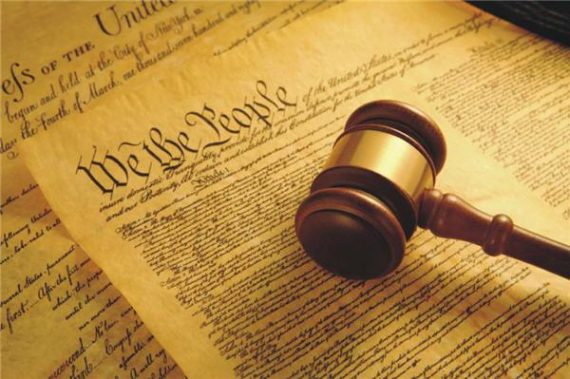DC Circuit Court of Appeals Upholds PPACA
The PPACA now has a 3-1 record in US appeals courts.
 Via TPM: D.C. Appellate Court Upholds Constitutionality Of Obamacare
Via TPM: D.C. Appellate Court Upholds Constitutionality Of Obamacare
A three-judge panel on the D.C. Circuit Court of Appeals — comprised of two judges appointed by Republican presidents and one by a Democrat — upheld the constitutionality of a key section of President Obama’s health care law in a ruling released Tuesday.
Senior Judge Laurence Silberman and Judge Harry Edwards ruled to uphold the law — specifically the mandate that requires Americans to purchase health insurance — on the merits. Judge Brett Kavanaugh dissented from their ruling, but he, too, would have ruled against the plaintiffs seeking to overturn the mandate. His opinion argued that federal courts lack jurisdiction to enjoin the mandate, which functions similarly to a tax.
Silberman, a conservative all-star, was first nominated to the D.C. Circuit by Ronald Reagan, and became a senior judge when Kavanaugh — a George W. Bush nominee — was confirmed to the court. Edwards was nominated by Jimmy Carter.
In their opinion, Silberman and Edwards conclude that penalizing individuals for failing to obtain health insurance is within Congress’ powers under the Constitution’s Commerce Clause.
It is worth nothing that DC circuit court is arguably the most important of the US appeals courts (at least those inferior to SCOTUS). This was an affirmation of the lower court’s ruling, which had upheld the constitutionality of the PPACA.
More from the LAT: In a surprise, D.C. appeals court upholds healthcare law
Giving a surprise boost to the new healthcare law, one of the nation’s most closely watched federal courts ruled Tuesday that law’s requirement that most Americans get health insurance is constitutional.
The split opinion by the conservative-leaning U.S. Court of Appeals for the District of Columbia marks the second time this year that a federal appellate court controlled by Republican appointees has backed the law and its insurance mandate
And though the ruling has little practical impact, it comes just as the U.S. Supreme Court begins considering the constitutionality of the landmark legislation that President Obama signed last year.
In terms of the appellate court scorecard:
With the opinion, three federal appellate courts – in Washington, in Richmond, Va., and in Cincinnati, have now rejected substantive challenges to the healthcare law. Only the 11th Circuit U.S. Court of Appeals in Atlanta backed such a challenge.
In regards to the author of the opinion:
One of the GOP appointees–Judge Laurence H. Silberman–was appointed to the bench by President Reagan and is considered a conservative intellectual leader on the court. He won plaudits from gun rights groups recently for writing an opinion that the District of Columbia’s handgun ban was unconstitutional.
But in a concise majority opinion in the healthcare case, Silberman categorically rejected the central critique Republican attack on the healthcare law’s expansion of federal regulation of healthcare.
Interesting, the dissenting judge based his position not on the substance of the case, but on the notion that he could not review the law until after it had actually gone into force in 2014.




It is not 3-1. It is 2-1-1. The 11th Appellate Court in Virginia did not rule on the case. They dismissed it without ruling on the merits of the case claiming the plaintiff had no standing to sue.
And I challenge the author’s memory: The Georgia Appeals Court ruled Obamacare unconstitutional with a Clinton-appointed judge joining the majority!
@Thomas: I will give it a look. I was relying on the LAT piece and did not double-check.
@Thomas: In regards to the 4th Circuit, I would count the ruling that the state had no standing to sue a PPACA win.
I assume by “Georgia Appeals Court” you mean the 11th Circuit–that is the 1 “win” for the PPACA.
So, I think that 3-1 is correct.
Interesting ruling. The opinion by Kavanaugh particularly is bizarre. I haven’t seen anybody punt like that since I last went to an NFL game with two bad offenses.
In any event, it’ll be quite interesting to see what the SCOTUS does. I’d still bet money that it’ll come down to what Anthony Kennedy smoked for breakfast that morning.
@Steven L. Taylor: I believe lack of state standing was part of the ruling, the other was that the anti-injunction act barred any attempt to enjoin a tax, so the court would have to wait until the dispute was ripe to make a substantive ruling.
Since the Obama lawyers are arguing lack of ripeness, that’s a win. But for those of us who just want a final ruling on the merits, its neither fish nor fowl.
@PD Shaw:
True–but at this point that is true of any ruling not handed down by SCOTUS, yes?
@PD Shaw
I’m no lawyer…but I don’t think that’s true…I think they specifically ruled that the penalty was not a tax. Again…I could be mis-reading the ruling…or maybe I’m mis-reading your comment.
@PD Shaw…
@Hey Norm: I believe the Fourth Circuit ruled that the penalty was a “tax” as that term was used in the anti-injunction act. If my recollection is correct it could be a “tax” for some purposes, but not others.
@Hey Norm: My comments were about the Fourth Circuit case (and why it might be fair to tally the results as 2-1-1), not about today’s DC Circuit case which I haven’t read. Maybe that’s the confuson.
Key line from the decision:
“Appellants cannot find real support for their proposed rule in either the text of the Constitution or Supreme Court precedent,”
Ouch.